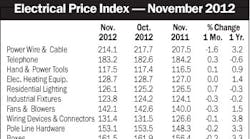Elliott Electric Supply, Nacogdoches, Texas, expanded its operations to 108 locations in the Gulf Coast and south-central U.S. with acquisitions of two branches from Treadway Electric Co., Little Rock, Ark., and the one-location distributor Key Electrical Supply, Houston, formerly owned by Integrated Electrical Services Corp. (IES), also based in Houston.
Elliott Electric has grown quietly but relentlessly over the decades, preferring to open “green-field” locations with its own lines, its own inventory and its own hand-picked people. The company typically opens six or seven new branches each year, sometimes as many as a dozen in a year.
“That’s the normal way we do things because it allows us to buy the inventory we normally stock and support the vendors we normally do business with,” said Bill Elliott, president. “We start out with a clean inventory — no dead stock — and we find a building that works for us, not something somebody else has cobbled together. It takes longer to get that kind of thing going, but there are certain costs that we avoid, too.”
Sometimes, however, an acquisition just makes more sense. Toward the end of last year, Elliott found two such acquisition opportunities.
Treadway Electric had two locations that weren’t fitting in with the company’s core business, located in areas where Elliott didn’t already have competing branches.
“In this particular case it worked well for Treadway because they had expanded rather rapidly, and they had a couple of locations that were not traditional for them, in the sense that they were not Square D locations, and they were away from their core business,” Elliott said. Elliott and Treadway are competitors in Little Rock and some other locations, but had no overlap in Springdale and Fort Smith.
Elliott and Treadway are both members of Imark Group, the Bowie, Md.-based distributor buying and marketing group, and it was through Imark that Elliott first learned of the opportunity. Imark has a program called “Imark First” to encourage any members who are contemplating a sale to confidentially explore merger and acquisition opportunities with other Imark members. “It’s a way to keep members within the organization, if possible,” Elliott said.
Meanwhile, IES was interested in divesting its ownership in Key Electrical Supply. Key Electrical Supply was one of the few electrical distributors in the country owned by an electrical contractor, a situation that came about in the late 1990s when IES was rolling together a number of smaller contractors. By last year, IES had come to consider Key as a non-strategic asset.
“There was every reason for them to get out of the supply business because that’s not their core competency. They’re electrical contractors and shouldn’t be in the supply business to begin with,” Elliott said. “They may have been buying materials slightly cheaper, but were losing money running Key.”
Elliott Electric Supply had discussed acquiring the Key Electrical Supply operations with IES before, but hadn’t been able to come to an agreement. The companies nonetheless were a good fit, both being Cutler-Hammer distributors focused on residential and light commercial projects.
“Because of the fact they handle same lines we do, and they sell into the same markets we do, their assets were more valuable to us than they would be to anybody else. They wanted to get out of it, we could afford to buy those assets because of the compatibility between ourselves and them, so that’s why it worked out.”
Elliott took over Key Electrical Supply at the end of February. Elliott expects to continue doing business with IES, which was by far Key’s biggest customer, though he expects to be able to expand with other contractors as well.
For Elliott, these acquisitions are just the latest steps in a broader expansion plan. “The reason why we’re branching out and opening new stores or buying stores is because we have excess capital,” Elliott said. “We don’t have any debt, and we have significant capital we’d like to reinvest, and structurally the challenge is to reinvest at the right time in the right place with the right people.”
The company is now ramping-up six new green-field locations that will be running by the end of the year, and Elliott expects to see more acquisition opportunities as well. “There’s more pressure for distributors to look to sell now. There are distributors that haven’t been making as much money as they expected, or they’re having bank relationship issues, so there are people who are more interested in selling now than have been in past,” Elliott said. “We happen to be in a wonderful position because we’re sitting on a lot of cash, and that combination makes it attractive.”
—Doug Chandler

